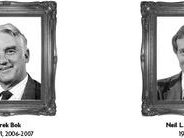Faust herself said that she considers responsiveness a fundamental component of leadership. “The way I understand leadership is a combination of listening and responding,” she said.
The selection of Faust also demonstrated an underlying push for a less polarizing leader.
“I believe that the Corporation had in mind that Larry Summers should shake things up,” said Peter L. Malkin ’55, a real estate mogul and long-time Harvard donor. “The Board of Overseers and the Corporation had in mind that she should bring them back together again.”
In addition to securing a leader with communication skills, Harvard’s governing boards sought someone who would continue her predecessor’s efforts to unify research and learning across schools.
“Most of us—certainly on the governing boards—feel that the priorities that Larry Summers articulated are still the ones that we should focus on,” Nannerl O. Keohane, a member of the Corporation, told The Crimson shortly after Faust was confirmed as University president in February 2007. “We wanted the same sort of vision, and we would have been really worried if we had a candidate who had come in and said that their priorities were 180 degrees in the opposite direction.”
“One University” was a key initiative as Summers pursued a more unified, cohesive Harvard.
“Harvard must—we must—cross over,” he said in his 2006 commencement speech, the final address of his presidency. “Cross over from old disciplines to new; cross over from old structures of governance to new; cross over from outdated lectures to new active modes of learning; cross over from the confines of Harvard Square and put down new, ambitious stakes, in Allston and beyond.”
The unification message resonated with Faust even before she became president. Leading the Radcliffe Institute—which did not have its own faculty at the time—required her to reach across different parts of the University to create “intellectual opportunities and synergies,” she said.
Bhabha, who joined forces with Faust to lead a faculty seminar on “cultural citizenship” during her time at Radcliffe, said that the seminar brought together faculty members from various schools across Harvard and was a “very informal intimation of the ‘One University’ idea.”
“You can see her vision as being to integrate the University,” said Bhabha of Faust’s leadership as Radcliffe Dean and later as University President.
Looking back, Faust said the concept of “One University” was “a seed planted” during her tenure as Radcliffe Dean, one that has “taken on a whole new set of understandings, expressions, [and] elaborations” from her vantage point as University President.
Since becoming president, Faust has repeatedly stated a commitment to unification, saying that her presidency has focused on “building connections and breaking down boundaries.” Several centralizing and interdisciplinary initiatives, from unifying the Harvard Library to creating the inter-faculty Harvard Global Health Institute, have characterized her time in Massachusetts Hall. Moreover, she has espoused and executed the priorities set by Summers, such as reforming corporate governance, improving financial aid, and overseeing development in Allston.
Today, Faust continues to push this vision, now seen as a central part of her administration.
Provost Alan M. Garber ’76 immediately turned to “One University” when asked to define Faust’s vision.
“I think that’s been a very powerful message of hers, and she’s worked consistently toward that goal,” Garber said.
Read more in University News
Canada Tells HKS It Is Time To Pass the Baton













